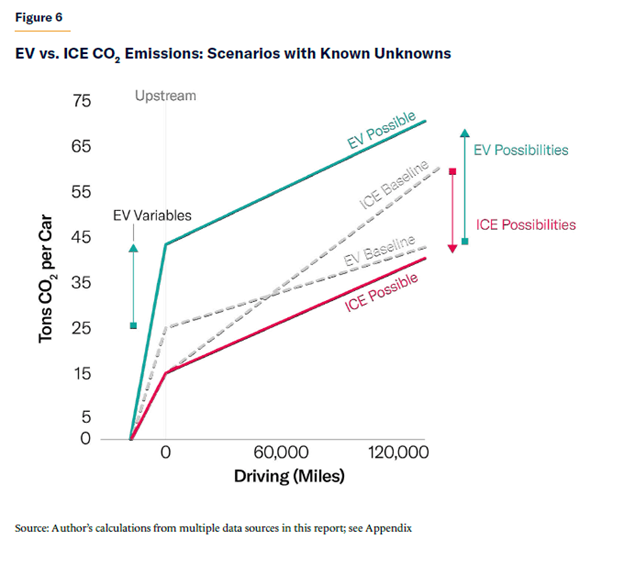The column below reflects the views of the author, and these opinions are neither endorsed nor supported by WisOpinion.com.
Although Electric Vehicles (EV) are a hot topic, they fundamentally have failed to compete in the marketplace. The major reasons for their success are government mandates, lack of attention to their environmental destruction and questionable energy benefits. Major problems include legitimate energy saving concerns; increases in our national debt, impossible goals, and the undesirable transfer of monies to the very rich.
Energy issues: EVs have larger carbon footprints than hybrids for at least the initial 40,000-50,000 miles because mining 500,000 lbs. for each EV makes a huge carbon footprint. Since EVs are driven about 12,000 miles/yr. and the average age of EVs is 3.4 years, currently EVs in the aggregate have a larger carbon footprint than hybrids. Americans are daily told differently. Many charts show that EVs save energy after many thousands of miles; some studies, like the following show EVs always have a larger carbon footprint than hybrids:

Environmental Issues: Lithium is essential for the manufacture of EV batteries and no industry person would “deny lithium causes enormous environmental damage.” The mining process uses vast amounts of water which results in flooded areas no longer available for agricultural use and the contamination of local water systems.The lithium required by one Tesla exceeds 30 hybrids (Toyota Prius). Recently , SUVs have increased 10%/ year of the market, [i]and SUVs require larger batteries.
>> WisPolitics is now on the State Affairs network. Get custom keyword notifications, bill tracking and all WisPolitics content. Get the app or access via desktop.
EV requires numerous rare earth elements which can pollute the air and water and cause soil erosion and environmental destruction. Each ton of rare earth elements produces 2,000 tons of toxic waste, which has devastated large regions of China. One electric car requires mining of about 500,000 lbs. of earth. Typical rare earth requirements include significant amounts of lithium, cobalt, nickel, graphite, copper, and about 400 pounds of steel, aluminum, and various plastic components.
EVs are for the Wealthy: Supporting EVs has been the largest government transportation policy ever that enables the rich to become richer. Although you can purchase an EV for less today, few poor people have bought a Tesla in the past (average cost $60,000). Few electric cars are purchased by families with only a single car and about half of all EVs are sold to families with 3 or more cars.
Government Debt Issues: Historically, excessive government debt has always led to hyper-inflation, national weakness, and bankruptcy. Many handouts go to big companies including tax credits for batteries including $2 billion yearly for Panasonic and $9 billion for Ford. The 2022 Inflation Reduction Act included $400 billion in EV tax credits, and total commitments are in excess of $500 billion. The argument for spending all this money is that the technology will improve until they don’t need government handouts. If technology is our goal, then lets have the US Government commit to spend $5 billion on private sector R & D. American ingenuity would accelerate and multiple our technology advances and we would save 99% of the $500 billion we have committed!
The Charging Stations Issue: The U.S. government has mandated that 50% of all cars must be electric in 7 years. The cost/ mile to commercially charge an EV is about equal to gas autos and will take 10 times longer to charge Charging stations will add billions to our national debt and billions to homeowners’ costs. The national electric grid cannot provide the electricity required to charge the anticipated homeowners’ EVs.
Regulation Issues: Numerous onerous regulations are being designed to eliminate gasoline cars including The National Highway Safety Administration’s proposal to raise mandatory fuel economy to 58 miles per gallon.
The Capitalist Solution: Let the market decide.Terminate all Government EV mandates. No scientific study has ever verified that the 300 million U.S. cars and 1.5 billion cars world-wide could all be EVs. The electric grid cannot handle this volume. Supply and demand and markets free of government interference will generate real wealth and provide us with freedom of choice which Americans deserve.
–Einhorn is a conservative activist from Mequon who wrote a book titled “Climate Change: What They Rarely Teach in College.”

